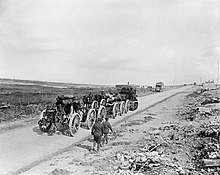Holt tractor



The Holt tractors were a range of continuous track haulers built by the Holt Manufacturing Company of Stockton, California which were named after company founder Benjamin Holt.
Between 1908 and 1913, twenty-seven of the first 100 Holt caterpillar track-type tractors were used on the Los Angeles Aqueduct project, which provided a good proving ground for these machines.[1]
Military use

They were widely used by the British, French and American armies in the First World War for hauling heavy artillery including the BL 9.2-inch howitzer and the BL 8-inch howitzer.[2] Around 2,000 Holt 75s along with 698 Holt 120s and 63 Holt 60s saw military use during the war.[2] The French Schneider CA1 and Saint-Chamond and German A7V tanks were based on Holt tractors.
Specification
There were at least three models used for military purposes: the Holt 75, the Holt 120 and to a lesser extent the Holt 60. The Holt 75 was first produced in 1913.[2] It used two tracks for steering. It had a maximum speed of 15 miles per hour (24 km/h) and had a gasoline engine.[3] In addition to US production 442 Holt 75s were built in Britain by Ruston & Hornsby in Lincoln.[2] Production of the Holt 75 was to continue post war until 1924.[2]
The 120 horsepower (89 kW) model had a tiller-type steering wheel at the front that was usually covered. It weighed about 18,000 pounds (8,200 kg).[4] It was developed in direct response to a request for a heavy artillery tractor.[2] The prototype was produced in 1914 with production beginning in 1915.[2]
The Holt 60 which saw limited use in the war was introduced in 1911.[2]
Literature
- Holt Tractors Photo Archive: An Album of Steam and Early Gas Tractors, ISBN 978-1-882256-10-5

References
- ^ "Caterpillar company history".
- ^ a b c d e f g h Orlemann, Eric C.; Haddock, Keith (2001). Classic Caterpillar Crawlers. MotorBooks International. pp. 20-22. ISBN 0760309175.
- ^ "Vehicles of the A.E.F. During WWI".
- ^ "British 'Tanks' of American Type; Officer of Holt Manufacturing Co. Says England Bought 1,000 Tractors Here". The New York Times. 1916-09-16. p. 1.
